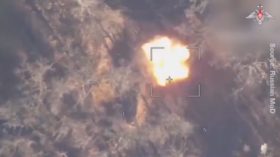Historic oil plunge: Massive bailouts in US inevitable but recovery still a distant dream, industry figures tell RT
As US oil prices suffered a historic collapse, industry insiders told RT that the unprecedented fall in demand will lead to bankruptcies and bailouts, with the coronavirus pandemic crippling the market’s chance of recovery.
West Texas Intermediate (WTI) oil prices dropped into negative territory on Monday, with vanishing demand and a glut in supply slashing prices to -$37.63 a barrel, the first time crude oil futures dropped below zero since the New York Mercantile Exchange (NYMEX) began trading them in 1983.
“If the WTI is at zero, it means that there’s no place to pour into left in America anymore,” economist Mikhail Delyagin told RT. Before that the prices for some types of oil were so low that it was “cheaper to pay for storage than just giving it away for free.”
Also on rt.com US oil market crashes to NEGATIVE in historic plummetThe fall in the US has not affected the prices in Europe for Brent crude oil. The situation is unprecedented, but rock-bottom demand is rapidly becoming a sort of ‘new normal’.
“Oil prices are going to remain under pressure because the producers have not reacted fast enough, given the amount of demand disruption that we’ve seen around the world,” Lipow Oil Associates LLC President Andrew Lipow told RT.
While the Organization of Petroleum Exporting Countries (OPEC) and producers outside the bloc agreed last Sunday to cut production by 9.7 million barrels per day, market analyst David Madden said that the bloc was too slow and didn’t cut deep enough to offset the fall in demand. Indeed, while the 9.7 million bpd cut accounts for ten percent of the world’s supply, demand is estimated to have dropped by 30 percent worldwide, since the outbreak of the Covid-19 coronavirus.
As such, companies still extracting oil will soon have nowhere to offload it, Lipow said. “Oil storage facilities, not just in the US, but elsewhere around the world, will fill up over the next six weeks,” he said, “and when that happens, producers will simply be forced to shut production, because there will be nowhere to go with some of their oil.”
Also on rt.com World going through ‘paradigm shift’ on oil as panic selling plunges WTI to historic lows – RT’s Max KeiserAmerican shale oil companies – which depend on a price somewhere around $40 per barrel to turn a profit – are already running in the red. The US government has already signed a historic $2.2 trillion stimulus package, while the Federal Reserve has cut its rates to zero. Against this background, Madden told RT that the shale industry will survive, but only with state aid, even with the government possibly paying these firms not to extract any more oil.
“In about six months time, US voters will be going to the polls to choose the next president,” he explained. “President Trump wants to stay in that job, so the last thing he wants to see is a surge in unemployment in oil-rich states like Texas and so on. It’s very much in his interest to keep the oil industry alive.”
Also on rt.com Global economy faces most severe crisis since WWII – Japanese foreign ministerIn the short term, Monday’s monumental losses will likely even out in a matter of days. The May crude contract expires on Tuesday, meaning traders have been rushing to sell their positions, fearful of hanging on to a valueless commodity. Futures for June and July have not quite bottomed out the way May’s have, and Madden said that “some stability and some normality” should return to the market in the coming week.
A full recovery, however, may be considerably further off. With air travel non-existent, industry shuttered, and roads worldwide free of traffic, an uptick in demand is “dependent on how quickly countries reopen their economies, and how comfortable the consumer is to leave their home,” Lipow said.
“We won’t see expensive oil of $60 per barrel – surely, not this year,” Delyagin concluded. “And most likely, we won’t even see it at $40.”
Think your friends would be interested? Share this story!















